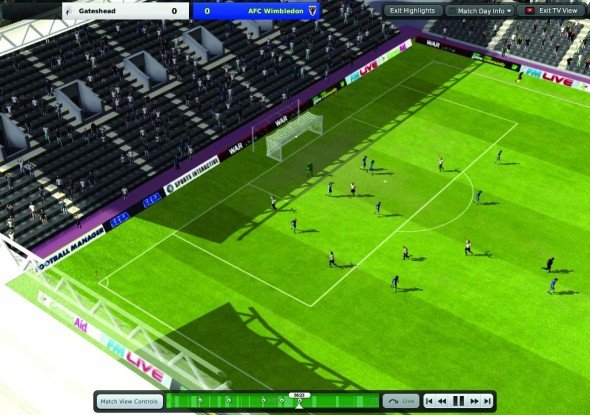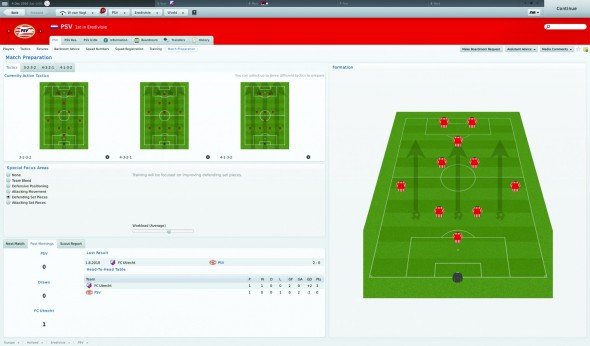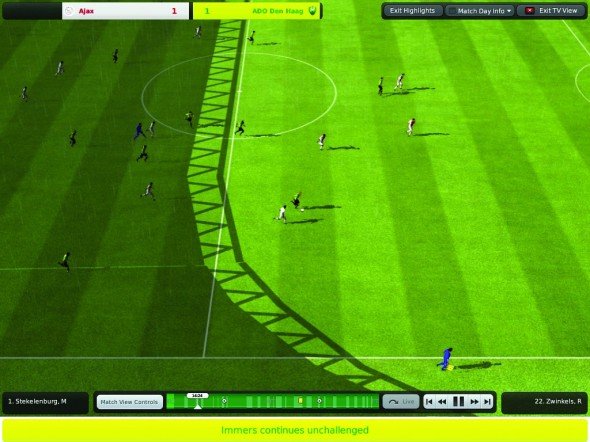Preview: why Football Manager 2011 will score big

Benjamin Franklin said three things are inevitable in life: death, taxes, and the country's yearly-reborn addiction to a new Football Manager. Sports Interactive's spreadsheet-'em-up has a rabid following, locked down by years of staggeringly complex iterations and worryingly emotional tales told about imaginary numbers masquerading as men. The formula certainly isn't broke, so there'll be no sweeping, game-changing features this year – expect instead FM2011 to be a refinement of 2010's 'consolidation year' output. That explained, let's get down to specifics: what is changing?
I spoke to Miles Jacobson, SI's Studio Director, to find out what differentiates this from the well-liked FM2010. “We've revamped the way that we handle news. We added subscriptions last year and we've expanded upon that, but we've also added in a kind of a calculator that will work out what your league and cup positions could be. It certainly does give you a better feel on the football world.” Information overload is the series' biggest problem, and so co-opting a wealth of news and other difficult to discern information and squeezing it neatly into a pretty interface is key to keeping FM fans' brains from exploding.

“We've improved the match engine, too. I mean we always improve the match engine code, but the look of it as well, so there are new player models, there are even new hairstyles, new crowds, new stadiums, backgrounds to the stadiums as well so they no longer just float in space.” A shame, really, extra-orbital matches would have some fun physics.
Jacobson acknowledged that the 3D match engine wasn't a feature begged for by the hardcore forum audience – so of course the classic text-only commentary stays – but the game's getting closer to that of watching a real match. Engine tuning will cut down on pitch anomalies that sometimes crept into last year's code, players sliding around like unearthly footballing hockey pucks. At the very least, it'll make a visually pretty break to the game's countless, and necessary, pages of hardcore statistics.
SI are stripping the complication from dealing with players and their finicky personalities, too. “Contract negotiations are now done 'live.' Rather then offering a contract to a player and him coming back to you in two days, you're having to renegotiate on the fly: you make your offer as though you're sitting at a table with the player.” As in the real game, agents play a major role in contract discussions. “Each player has an agent, and those agents have different personalities. Some will come to you and say “put your best offer first”, some will say “this is what the player wants and there's no negotiation”. This opens up extra behind-the-scenes money play: "Speaking to a bunch of chief execs and agents in the game, they provided us with information for loads of extra contract clauses: like a young player signed as a hot prospect with a trigger that might bump them to a first team wage."

Training has had a rejig, Jacobson having picked it out as an area that was overdue for some reconstructive surgery. A larger range of options lets you train players in areas usually restricted – your midfielder can now wrap his tiny head around the concept of finishing, for example. Training extends to getting ready for the next match: “your assistant will ask how you want to prepare. You can then ask for your coaches to look at up to three specific formations you might play during the match, which they will then train those players in so they have better knowledge going in.
"You're also able to ask them to concentrate on play style, set pieces, or even team blend. So if you are Man City and you buy 20 new players it will help those players gel, but might take away from other training areas.” Fingers crossed we'll get to actually see these team-building exercises. James Milner, get this barrel across this gap without it touching the floor.
The biggest gaming news, reviews and hardware deals
Keep up to date with the most important stories and the best deals, as picked by the PC Gamer team.

In keeping with FM2011's cult of personality, training requests are no longer handled robotically. In the last game, requesting a right-back to play on the wing was answered inexplicably by the player commenting in the newspaper the next day. “Now a player will talk to you there and then. If they say no you can suggest something else.” Like some kind of freewheeling man-management maverick, you can also use your word as boss to make your players do your bidding: Jacobson explains via the medium of a story. “I had a fight with a player who'd recently joined me because I signed another striker. I told him that he was my first choice, but he didn't believe me. We had a bit of a ruck and two days later he asked for a transfer. But I kept my promise, played him, and he backed down.” Players react in specific ways depending on their personalities – throwing something tangibly human into a game that can look from the outside like a random assortment of numbers.

